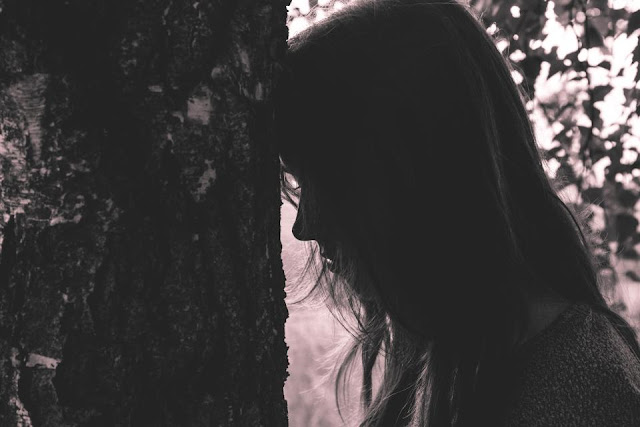Postpartum Depression- After the Birth of a Child or After A Pregnancy Loss
 |
| Sadness...a manifestation of Postpartum Depression. Image credit: StockSnap |
I experienced postpartum depression (PPD) and it is an experience I would like to share. She was born premature and passed away due to respiratory failure. After her death, I grieved. People said it was understandable because I had lost a child and said it was a normal reaction to the loss. They told me to mourn for as long as I want, to take my time because, in the end, time does heal all wounds. However, it took me quite some time to get past it and it took a toll on me. My partner became worried that I was somehow being sucked into a vortex and I just didn't feel the urge to come out. That's when I went to seek professional help to get answers- is this a phase or really a part of mourning or was it something else?
The health professional said I was experiencing postpartum depression. My lack of sleep, lack of appetite not only for food but a lack of an appetite for life, my bouts of hysteria and weepiness, and my overall lack of maintaining my appearance and hygiene was also a concern. Given the circumstances of what triggered this spiral downward fall, the physician was concerned that I was blaming myself for the loss. I was on self-destruct mode and I couldn't find it in myself to shut it off.
When I look back at what happened to me and remember Tom Cruise debating with Brooke Shields (she also experienced postpartum depression) on the false existence of postpartum depression saying there is no such thing as a chemical imbalance and that psychiatry is a pseudoscience, I actually want to actually shout that postpartum depression is real. I know that he and his religion will still deny the fact because they don't believe in it, but for moms out there, who have experienced postpartum depression- you are not alone because postpartum depression does happen, it's real and it can happen to anyone. It not only affects new mothers who have had a successful delivery, it also affects women who have gone through a pregnancy loss.
What is postpartum depression?
Postpartum depression happens after having a baby- successful or otherwise. It is a complex state in a woman experiencing physical, social, emotional, and behavioral changes occurring after "giving birth" and this is due to abrupt chemical or hormonal, social and psychological changes associated with having a baby or losing one.
Types of Postpartum Depression
Postpartum Blues
- this is also known as the "baby blues". This condition is common and is experienced by 70-80% of new mothers. It is considered as a less severe form of postpartum depression and is common but, should not be ignored nonetheless. Many new mothers experience some negative feelings, anxiety, frequent prolonged bouts of crying with no apparent reason, mood swings or sadness after giving birth and are usually confused about these "inappropriate" feelings after a joyous event of a new baby. These symptoms of the baby blues usually begin in the first week (1-4 days) and are said to resolve within 2 weeks without medical treatment. Usually, family, friend or group support, and assistance help new mothers cope with the baby blues.
Causes of the Baby Blues
Abrupt hormonal changes, as well as changes in lifestyle and a disruption of routine associated with a newborn, are said to contribute to the baby blues. Also, emotions during the birthing process itself may also contribute to how a new mom feels.
Postpartum depression
-Although postpartum depression and the common "baby blues' have symptoms in common, postpartum depression is a more serious mood disorder and affects up to 1 in 7 women. Postpartum depression can affect any woman.
 |
| Crying helps. Image credit: StockSnap |
For new mothers, the difference between postpartum blues and postpartum depression is that those affected with postpartum depression experience additional and severe symptoms such as inability to care for the newborn and oneself uncontrolled anxiety that prevents sleep and proper eating, withdrawing from your partner, overwhelming thoughts of guilt and worthlessness, and fatigue, and it lasts for more than 14 days. The symptoms of postpartum depression don't resolve on its own, and if left untreated may last several weeks, several months even up to a year.
Symptoms of Postpartum Depression in New Mothers
• Anxiety or panic attacks
• Loss of appetite or eating much more than you usually do
• Insomnia or sleeping too much
• Sadness, bouts of weepiness for an extended period of time
• Fear of not being a good mother
• Fear of being left alone with the baby
• Misery
• Disinterest in the baby, friends, and family and withdrawing from them
• Excessive irritability, anger, or agitation with apparent mood swings
• Racing, scary thought
• Feelings of guilt and worthlessness
• Loss of pleasure with the things you used to enjoy
What factors increase the risk of a new mother having postpartum depression?
• Having a medical history of depression or postpartum depression from a previous birth- those who have had postpartum depression before has an increased risk of 30%
• Being diagnosed with premenstrual dysmorphic disorder
• Age during pregnancy- the younger the age, the higher the risk
• Marital conflict
• Living alone and limited social support
• Already diagnosed with Depression- 50% of depressed women will have postpartum depression
• Feeling of ambivalence toward the pregnancy
• Having a baby with special needs (premature, has a medical illness or complication)
• Having a challenging baby who cries more than usual, is hard to comfort, or whose sleep and hunger needs are difficult to predict.
• Financial or employment problems
• First-time motherhood
• Other emotional stressors like death in the family
Causes of Postpartum Depression
- As with postpartum blues, an abrupt drop of hormones after delivery- it is said that hormones drop back to pre-pregnancy levels within 3 days after giving birth; aside from the chemical changes within the body of the newborn, social and psychological changes associated with having a baby contribute to postpartum depression.
Grieving women after a pregnancy loss and postpartum depression
It has to made clear that women grieving after a pregnancy loss may also experience postpartum depression most especially if the pregnancy was quite advanced as in my case of 7 months. The fact remains that the woman was pregnant.
Grief and postpartum depression may be confusing to sort out because of the similarities in emotions and feelings experienced by the woman. While grief is a normal response to an abnormal event (loss of a child) and requires support, education, and understanding to move on, postpartum depression is a mood disorder that requires medical treatment.
In grief, the pain subsides with time. Usually, the woman is able to carry on with daily strife albeit with a heavy heart, momentarily lapsing into weepiness thinking of the tomorrow that might have been, but moves on, little by little. But, sometimes the grieving process may become severe causing the inability of the woman to function properly in daily routine, inability to take care of herself, having bouts of anger and hysteria, anxiety, overwhelming guilt, insomnia, and loss of appetite, prolonged bouts of weepiness, and overwhelming sadness- symptoms of postpartum depression.
For women suffering a loss, talk to a health professional regarding groups with similar experiences. I do not recommend going to a support group of ambivalent moms.
Seek professional help. Depression is never normal even if you are dealing with a loss.
Postpartum Psychosis
-this is a rare and extremely severe form of postpartum depression and requires immediate emergency medical attention and may require the new mother to be admitted to a hospital. It affects 1 in 1000 new mothers.
Symptoms of Postpartum Psychosis
• Severe agitation
• Confusion
• Feelings of helplessness and shame
• Paranoia
• Delusions or hallucinations
• Hyperactivity and rapid speech
• Insomnia
• Mania
• Thoughts of hurting yourself or the baby
In postpartum psychosis, there is an increased risk of suicide or inflicting harm on the baby or oneself.
How to test for postpartum depression?
The Edinburgh Postnatal Depression Scale is a screening tool to help you detect if you are suffering from postpartum depression. Read and follow the instructions carefully. A score of 13< suggests that you're u may need a more thorough assessment from a medical professional because you may be suffering from postpartum depression.
How is postpartum depression treated?
Treatment options include psychotherapy, using prescribed anti-anxiety or antidepressant medication, and joining a support group. For those diagnosed with postpartum psychosis, hospital admission and drug therapy are usually necessary.
For breastfeeding mothers, there are no reports of babies who have suffered ill effects from breast milk of mothers taking antidepressants.
When should a mother/woman seek medical or professional help:
• Edinburgh test results 13 <
• Symptoms last for more than 14 days
• Mother/Woman is unable to function normally
• Mother/Woman is unable to cope with everyday situations
• Mother has thoughts of inflicting harm on her baby
• Mother/Woman has thoughts of inflicting harm on herself
• Mother/Woman feels extremely anxious, scared, and panicked most of the day.
How Can You Take Care of Yourself?
-Don't face postpartum depression alone. Look for help. You may talk to your doctor, join a support group, talk to your partner, friend or family member.
- Adopt a sensible diet, refrain from taking alcohol or caffeine
- Ask help to take care of the baby
- Get as much sleep or rest that you can
- As soon as your doctor gives you the OK, get some exercise, go out and take a walk
- Foster your relationship with your partner
-Try not to sweat on the small stuff. Be realistic about what you can actually do while taking care of a newborn.
- Don't expect perfection in the first few weeks with your newborn baby. Give yourself ample time to heal and to adjust to your new "job" as a mama.
Do not despair... With the proper professional help and medical attention, almost all women who have experienced postpartum depression are able to overcome their symptoms. You are not alone. If your symptoms last for more than 14 days, it may indicate a more serious condition. Talk to your doctor. Don't worry and don't feel embarrassed... They talk to women experiencing these things every day. Postpartum depression is not your fault, it is real and it happens and can be treated. Don't wait, take action. And you will soon start feeling better.
*Credit to Sources:
Stone, Katherine "What is the Difference Between Grief and Depression After Pregnancy Loss?", www.postpartumprogress.com
"Postpartum Depression and the Baby Blues: Signs, Symptoms, and Treatment for Depressed New Mothers", www.helpguide.org
"Baby Blues", American Psychological Association, www.apa.org
"Postpartum Depression", www.apa.org





It's hard being a new mom...the demands of a newborn, your body is healing, and so many other things to deal with. New moms...ask for help. There are people around you that love you and the baby and are willing to do anything for you.
ReplyDeleteInteresting post
ReplyDeletePostpartum depression is indeed getting rampant. As a health practitioner, I think the best remedy is psychotherapy. Making use of anti-depressant tends to be harmful to the mother and the new born child. Anti-depressant should only be taken when the situation is very severe.
ReplyDelete